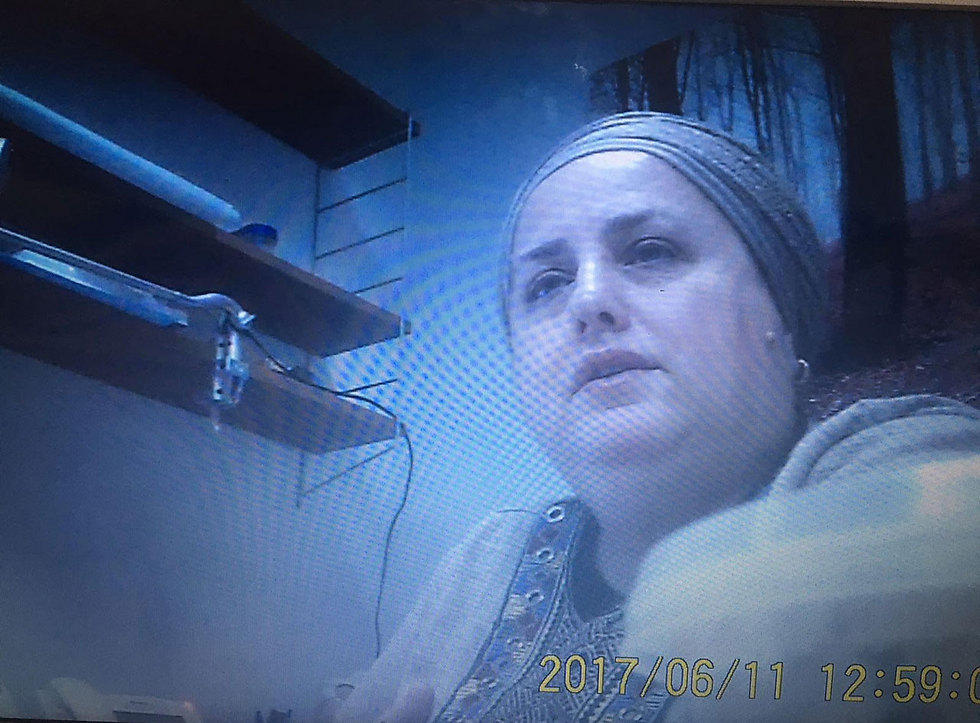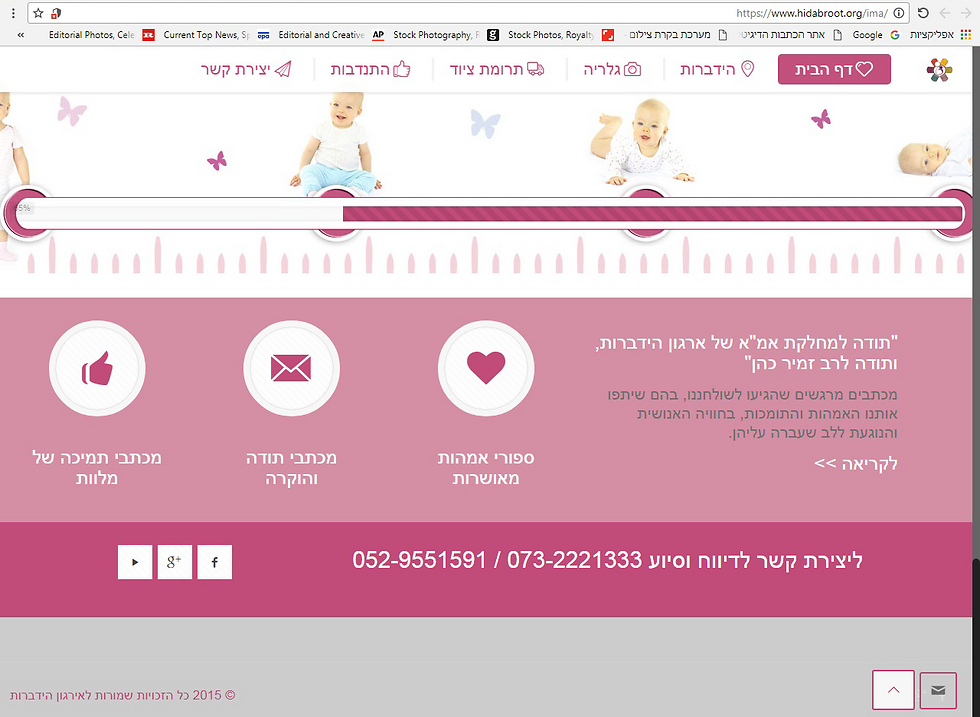
The organization pressuring Jewish women not to get an abortion
Hidabroot, which started out 15 years ago as a small organization encouraging a return to religion, has become one of Israel's largest associations, with an annual turnover of nearly NIS 50 million, a TV channel, an online matchmaking service and special departments against assimilation and abortions. Yedioth Ahronoth investigation uncovers the organization’s well-oiled system of intimidation, harassment and financial incentives to stop young women from terminating unwanted pregnancies.
Yaeli (not her real name) wanted to end an unwanted pregnancy at an early stage. She will never forget what happened from that moment onwards: Pressure, harassment, implicit threats. All because her friends turned to the Hidabroot organization, she says, and informed them of her intention to get an abortion.
Hidabroot started out 15 years ago as a small organization for bringing Jews closer together (“kiruv levavot”)—or, in other words, bringing Jews back to religion. Led by Rabbi Zamir Cohen, it has become one of the largest associations in Israel, with an annual turnover of nearly NIS 50 million (roughly $14 million) and some 450 employees, as well as subsidiaries that own the Hidabroot television channel, an online matchmaking service, an e-commerce website, a unique kosher television converter, and more.
In the past two years, the organization has set two new goals for itself: Preventing assimilation (which Rabbi Cohen refers to as “a quiet holocaust”) and a war on abortions through the IMA Anti-Abortion Department.
Following Yaeli’s testimony, we conducted a comprehensive investigation in recent months into Hidabroot’s activity. We sent a “volunteer” to train there, we used the organization’s snitch line to report on a woman who got pregnant and was interested in getting an abortion, and we sent her to meet with the members of the organization.
The findings point to the use of problematic methods, in terms of “the end justifies the means”: Psychological pressure, aggressive techniques, harassment, intimidations and briefings on how to extract funds from the state despite not being legally eligible.
The testimony: 'We felt trapped'
“I’m afraid you’re collaborating with them,” Yaeli says hesitantly. Barely a year has passed since she felt persecuted by the Hidabroot organization, which tried to stop her from ending an unwanted pregnancy, and she has yet to recover from the trauma.
Yaeli, 26, a former ultra-Orthodox woman who looks significantly younger than her real age, discovered she was pregnant and considered an abortion at her partner’s request. “I thought it over,” she says. “I shared it with two Haredi friends, and they apparently turned to the Hidabroot and Efrat organizations without my consent.”
That’s how Yaeli’s private nightmare began. She says they declared war on her partner, calling him “Satan.”
“They said really bad things would happen to me and made threatening phone calls to my partner. We felt trapped.”
People she didn't know contacted her parents—although she isn’t in touch with them—and other members of her family as well, she says.
“One day, we went to the Beilinson hospital, for the abortion procedure, and people were waiting for us there,” she says. “They simply followed us.”
A week before the abortion, Yaeli and her partner went undercover. While they were hiding in a different apartment, a woman from the building they used to live in informed them that “there were strangers here.”
Those people, she says, even contacted her partner’s parents and told them everything.
This kind of activity isn’t typical of the Hidabroot organization, but it does match the practices of radical Haredi organizations, which may have gotten involved in the affair. Members of these organizations often arrive at the homes of people who have left religion or young people who have “gone astray” and, at their relatives’ request, intimidate them and sometimes even exercise violence against them.
The harassment stopped, she says, only after she told the Hidabroot members that the procedure had been completed and that the fetus was gone.
“You’ll regret it for the rest of your life,” they told her before disappearing. “When you regret it, you’ll come to us to convince other young women to avoid an abortion.”
The volunteer: 'A harmful, damaging soul '
The war on abortions and assimilation is overseen by Kalina Schwartz, Hidabroot’s chief of staff. We reached her through the telephone number published on the association’s elaborate website and sent over an investigative reporter to try to volunteer in the organization.
“Two years ago, I had an abortion and my partner escaped,” the investigative reporter told Kalina when she asked to volunteer to prevent other girls from getting an abortion.
Kalina briefed her on how to talk to women who arrive for a consultation. “Abortion is murder!” she told the new “volunteer” firmly. “God said to Cain, ‘The voice of your brother’s blood is crying to me from the ground.’ He was referring to all the generations he would have produced. He cut them off.”
Kalina clarified that repentance won’t help a woman cleanse herself from an abortion. “It’s between her and God. What is between her and the soul she cut off? She must undergo a tikkun (rectification).”
Is this what I should say to women who want to get an abortion?
“Exactly! I want you to understand how important it is. There is a soul that was supposed to come into the world and it was cut off. It won’t let go. It will harm whoever stopped it from coming into this world. It has no mercy, only harm. You’ll get married and have children, and that soul will harm them.”
Kalina says there are hundreds of volunteers in the organization, although the Registrar of Associations documents have only two volunteers registered in 2016 compared to more than 450 paid employees.
In a meeting with her in the organization’s offices in Petah Tikva, she recommended repeatedly using the word “murder” in conversations with the women considering an abortion.
“Sometimes, when they would show on social media how an abortion is carried out, people would write, ‘Wow, shocking, you people are insane,’” she said. “We’re insane? The people who do it are insane.”
She doesn’t hide the cooperation with the more veteran organization, Efrat. “We work in cooperation with Efrat,” Kalina told our investigative reporter. “They provide equipment, and we send our activists, who is also theirs. I have hideouts, for example. Efrat doesn’t have that.”
The snitching: Murder, ‘din rodef’
We call the snitch line and inform the organization about a young girl named Adva who was seen crying in the HMO. “She got pregnant from a married man and wants to get an abortion,” we say. Kalina, on the other side of the line, asks a few questions and quickly writes down the name and details.
Barely two minutes go by before Adva’s phone rings. Adva, our investigative reporter, isn’t really pregnant, but her cover story is of a young woman who got pregnant from a married man and is interested in an abortion. We documented what she went through step by step.
“This is Kalina from the Hidabroot organization speaking,” she introduces herself. “I was approached by someone who wants to help you. She understood that you’re in some kind of trouble, pregnant, and that your parents kicked you out. How far along are you?”
Nine weeks, and I already have a committee next week. I want to abort the child. I don’t want to have it.
“Are you sure you don’t want to have it?”
Yes.
“You can’t abort. It’s an absolute curse. It’s very easy to say ‘aborting.’ You are killing it. You don’t want it? No problem, but it already exists. You made it come. It’s a life for all intents and purposes, and then it goes with the woman her entire life.”
Kalina moves on to offer financial solutions: “This child actually brings you money. After the birth, you’re entitled to something like NIS 4,000 for this child, and daycare might cost you 400 shekels. So this child doesn’t really cost you anything.”
Okay, but what about me? What about what I want?
“You should take responsibility. Why didn’t you think about it beforehand? Your life won’t be destroyed. It will be destroyed after an abortion. Forget about the committee. We don’t care about them. The people there are people of Pharaoh. The operating table is their livelihood.”
Adva insists. I don’t want to have this child, she says. “You do!” Kalina says, angrily. “You don’t want it? Give it up for adoption. Why are you killing it? We’ll provide you with mental health aid. We’ll help you with housing.”
Kalina’s pressure on a woman who is allegedly in distress only increases. Time and again, she refers to abortion as “murder.”
“The same soul that is cut off chases the woman who eliminates it her entire life,” she threatens. “It’s a ‘din rodef’ (law of the pursuer).”
Before bidding her farewell, Kalina schedules a meeting with Adva the following day at the Hidabroot organization’s offices in Petah Tikva.
The meeting: ‘You’ll have the child. Understood?’
It’s before noon at the Hidabroot offices in Petah Tikva. An impressive office from the inside and from the outside, which is equipped with cameras and seems to be in the middle of a renovation. A large chandelier with crystals hangs at the entrance. On the right and on the left, there are Bibles arranged on shelves.
Adva, our investigative reporter, rings the bell, and a young man with a skullcap lets her into the building. Kalina, wearing a headdress, welcomes her with a smile and offers food and drinks. She is very assertive, focused and appears to have impressive persuasion abilities. She may have sounded impatient on the phone, but now she gives Adva the feeling that she has all the time in the world with a soft and friendly attitude, although she does keep up the pressure.
“You say, ‘I can’t raise it.’ But you can kill it? You’ll be carrying this killing around your entire life,” she charges. “We’re all here to stop you from making a mistake you’re going to pay for your entire life.
“There are three things that are forbidden: Assimilation, idolatry and murder. Don’t be afraid. You’ll be afraid if, God forbid, you get an abortion. That’s your fear. It will affect your life your entire life. We don’t murder the child even if it arrived the wrong way. You’ll give birth to the child and you’ll be blessed. Do you understand?”
The conversation is interrupted by a phone ringing. Kalina picks up the phone. It’s an assimilation case. “Hold the line,” she requests and transfers the call to a girl named Esther.
The Hidabroot association began dealing with “assimilation prevention” and abortion prevention less than two years ago, but it seems Kalina is approached with many cases.
When the conversation ends, Kalina gets back to Adva and offers her a “personal caretaker.” In other words, a supervisor. Someone who will serve as her shadow and accompany her everywhere. She then explains that if at the end of the process Adva decides she doesn’t want the child, they—Kalina and the Hidabroot association—will help her.
How? “We go to the social services and ask for a foster family for as long as the woman decides. It could be for a year, two years, three, four, until you decide whether to place him for adoption or take him,” she says. “We have saved more than 2,000 women.”
We asked social services whether they were cooperating with the Hidabroot organization. An official there explained that there is no regular cooperation and that they naturally work with whoever it takes to help the needy.
A phone call to the father
When she feels the message has been internalized, and the “shaken” Adva is deliberating again whether to abort the baby or keep the pregnancy, Kalina moves on to the next step: Handling the person who got her pregnant.
As the first move, she offers to call the guy, “Alon,” herself and inform him that he is the father, without checking whether the information she received is accurate.
Adva expresses her reservations. “Don’t be afraid,” Kalina says. “I’m here. I’ll break his bones. I’ll rip him apart. I deal with Arabs, he’s a piece of cake for me.”
Adva hesitates. Talking to him now would scare him. “Let him be scared, so what? You’re scared too. Don’t be bothered by these things. You’re naïve. I’m telling you, you should talk to him. He should be a bit scared. He should come help. If not, no problem. She’ll sue you for child support. We’ll stress him out.”
He’ll be angry. I told him I was on the pill and I missed one.
“No one’s asking him anyway. What do you mean he’ll be angry? Nothing happened. It was God’s will.”
What if he doesn’t want to help?
“Listen, sweetheart, we won’t beat him up, but we’ll harass him a bit.”
Kalina picks up the phone and calls “Alon,” another investigative reporter. At first, she introduces herself cordially. “I’m talking from the Hidabroot channel, Channel 97, spreading Judaism. We are a department that helps pregnant women. I’m here with Adva. I’ll put you on speaker so she can hear you.”
“I have no idea what you’re talking about,” Alon says firmly, as we instructed him. “I’m a married man.”
“You were in a relationship, and she’s pregnant,” she insists. “We’re supportive here. She doesn’t want to hurt you. She doesn’t want to sue you for child support. She just wants you to know.”
Alon raises his tone, and when Kalina puts him on speaker, Adva immediately informs Alon that she has an appointment with a termination of pregnancy committee. Let’s make it short, he replies. Let’s go to the hospital and get it over and done with.
“Alon, listen,” Kalina interrupts him, raising her voice. “We’re not here for you to execute her, or the child. She doesn’t want to ruin your life. I’m from a television channel,” she drops a hint. “I’m not here to do a show about you, I’m here to help her. Listen to me carefully. If you try to be a smartass, we’ll go both to the police and to your wife. So don’t be a smartass and don’t make threats.”
When Alon gets irritated, she cuts to the chase. “Just one more unnecessary word and we’ll summon your wife. You’re not in charge here. We’re not blackmailing you. She doesn’t want to file a claim. Don’t call her anymore. Your conversations are recorded, and you don’t call the shots. If you get in touch, she’ll file a complaint against you with the police. Consider yourself warned.”
Now Kalina starts giving Adva orders. “Did you block him?” she inquires. “Good! Don’t answer any phone number you don’t know. I don’t want him to brainwash you, that’s all. I don’t want you to talk to him. We have donors who provide an apartment.”
When Adva asks what she should do about her medical tests, Kalina advises: “Don’t do any tests, nothing.”
I don’t want to have a child with a defect, God forbid.
“Don’t have a nuchal scan or an alpha-fetoprotein (AFP) test. It’s no good. Get blood tests and an ultrasound and that’s it. In 90 percent of cases, the child is healthy. They just tell you nonsense. You can see everything in the ultrasound scan. The HMOs, of all bodies, are the biggest thieves. It’s an industry of money. And whoever has amniocentesis is stupid. It harms the fetus.”
Meanwhile, until she finds out if Alon plans to do anything, Kalina offers Adva a convenient interim solution: An apartment in Kiryat Malachi, which will be ready next week.
“In the meantime, we’ll give you an escort,” she says, handing her the phone number of Helen from the Efrat association. “They help you after the birth,” Kalina explains. “Later, she’ll take your ID, certificates, etc. Until the age of 1 or 2, you’ll be sent diapers, pacifiers, etc., to your home.”
Apart from the psychological pressure, the main thing helping Hidabroot fight abortions, as well as “assimilation,” is the money. Kalina offers Adva an apartment, cash money, support on behalf of the Efrat association, and more. She doesn’t settle for that and also teaches her how to deal with the National Insurance and the baby’s father, in problematic ways too, which we will elaborate on later.
A moment before Adva leaves, Kalina turns to a new topic. “This afternoon, a young rich man is supposed to come here to find a decent match,” she says. “Perhaps he’s the guy for you! So gentle and kind like you. There’s only one problem: He’s looking for an observant girl. Perhaps you’ll grow more religious later on.”
The conversations: Horror pictures and harassment
As soon as the meeting ends, just like Yaeli said, Adva is bombarded with messages and phone calls from volunteers. The next day, she informs Kalina of her decision to go to the termination of pregnancy committee after all. It’s her final decision.
Kalina is shocked. “That’s like a headspring into a pool without water,” she says. “It’s a sure death. You met with me and you listened, and you’re still choosing the curse? Don’t say you didn’t know. you listened to Pharaoh (meaning Alon). He’s pressuring you and you’re sensitive. You’re choosing the evil, death and a curse.”
When she realizes that Adva won’t change her mind, Kalina sends her horror pictures of allegedly dead fetuses. “I don’t use all my tools to intimidate,” she says. “I have a lot of tools. I want to shake you. Check your phone.”
Oh no, what is that?
“What you’re looking at now is week 6 or 7, much smaller than yours. You see him holding a finger? Yes? Now come see this woman, you see her? With the (dead) baby between her legs?”
Shocking.
“This one got an abortion because her parents made her do it. It was a child from an Arab man, so we didn’t get so involved.”
Immediately afterwards, using the carrot and stick method, she sends another picture, of a woman with a child. “Look how cute she is,” Kalina is impressed. “She gave birth at around age 16. Look at her today, like a doll. Look how happy she is with him. Do you want to talk to her?”
Then a video of Rabbi Zamir Cohen arrives.
The other Hidabroot and Efrat volunteers keep calling and sending messages too. Most of them are sweet and friendly, but together they create constant pressure.
In the next conversation, Kalina keeps trying to frighten Adva.
“I just spoke to someone for two hours. She got an abortion when she was young,” she reports. “Her father says she was a fighter, a combat soldier, and today she’s on medications. The husband left her. They want to take her children away. It’s a mess.”
But I spoke to a friend and she told me…
Kalina interrupts. “There is no friend that understands about it! Only someone who went through it can tell you. I can send you a picture of what a living fetus looks like at that age. A real baby. Look at you, without the child you’re worthless. You’re living with friends. Who will be with you? You’ll stay single. In a week I’ll have an apartment for you, as good as new.”
At this stage, she offers another treat: A weekend at a hotel in Tiberias, for single women, at Hidabroot’s expense. “You may meet Rabbi Zamir Cohen there,” Kalina suggests. Adva declines politely, both the apartment and the weekend. Tomorrow I’m going to the termination of pregnancy committee, she insists.
The charlatan: A king’s son in your belly
Now Liza, a volunteer with a heart of gold, gets in touch. A moment before the situation becomes irreversible, she asks Adva to join her “on a visit to some rabbi in Ramat Gan. He doesn’t charge any money, and you’ll be able to seek his advice on anything.”
At around 7 pm, Adva arrives at the Shalom Synagogue in Ramat Gan’s Amidar neighborhood, where she is supposed to meet with Rabbi Yitzhak Peled. The entrance is dark and derelict, with cigarette butts scattered on the floor. Ten women, most of them with a headdress, are standing near the entrance and waiting. An older woman approaches and tells them how, thanks to becoming religious, she became fertile after years of infertility.
After Liza and Kalina arrive, Adva goes into the rabbi’s room. “I feel a lot of anger inside about the past,” the rabbi says. “I’m simply diagnosing you according to your face.” He asks Adva to write down all the details about her family and the educational institutions she went to. “You seem like a very smart girl with intuitions,” he says.
I don’t seem to have any intuitions at all.
“They’re deep inside. You don’t know how to express them.”
Now he asks her to open a random page in a book. “That’s what has been decided by God!” he cries out. “You see, first of all, did they tell you that you have a boy in your belly? Because here you see the word ‘your righteousness to a son.’ A high spirit, a king’s son. There are ranks, you know. There are higher people—Rabbi Kaduri, the Baba Sali. You have a king’s son, something of a very high level, in your belly… You have a soul in there that needs to be saved. They are about to shed the blood of what you have in your belly.”
Adva goes home. The next day, she informs Kalina that she passed the termination of pregnancy committee and that the abortion has been scheduled for Sunday. From that moment, she stops answering calls and messages, despite receiving more and more: From Kalina, from Liza, from Helen, from Naomi.
Women who really are pregnant and distressed, and fall into the organization’s hands, might just give in to this kind of pressure.
‘Abortion is forbidden’
The Hidabroot association offered the following comment: “The association operates as an information center for women who appeal to it, in a bid to prevent unnecessary abortions from women, out of the belief that abortions are a termination of human life. It is therefore forbidden, apart from special cases, such as cases in which the mother is in a life-threatening situation.
“We receive many appeals from women who have aborted their babies and regret it, and countless thank you letters from women who decided not to abort their babies thanks the help they received.
“Tens of thousands of abortions are performed in Israel every year, officially and unofficially. In many cases, the abortion is performed as a result of external pressure on the woman from the child’s father or other relatives. As it isn’t performed out of the mother’s free will, it causes her a lot of grief and regret in the future.
“The Hidabroot association gives pregnant women who appeal to it mental and material aid, to make life easier for the mothers and their babies. We are proud that, thanks to the association’s activity, the people of Israel have grown by hundreds of people whose fate would have been to be thrown into the garbage had it not been for the association’s activity.
“Some of the women who provide a response are dedicated volunteers, who see the woman’s best interest before their eyes. In response to your questions, we plan to check whether, in the said case, there was a deviation from the association’s policy, which states that the aid efforts will only be conducted in a pleasant manner and using appropriate language.”
The Efrat association offered the following response: “The Hidabroot organization refers pregnant women in distress to the Efrat association, so that Efrat will provide them with financial support and equipment after the childbirth. Since the Efrat association has no apartments for pregnant women, there are few cases in which we refer women in need of a temporary place to live to the Hidabroot organization.
“The Efrat association operates in accordance with the law, and will do everything in its power and within the framework of the law to help pregnant women in financial distress who need the association’s financial aid to avoid getting an abortion.”
Business turnover of NIS 47 million
According to documents submitted to the Registrar of Associations, Hidabroot’s main goal was “to bring Jews closer together, to manage and establish yeshivot and kollelim for yeshiva students, to establish and run educational institutions, kindergartens and schools for Torah study, to create and run religious and religious-scientific research institutes, to help and support the needy.”
In its first years, the association existed mainly on allowances from different foundations for the distribution of Judaism, with a turnover of around NIS 1 million (roughly $280,000). Its CEO since then has been David Topik.
In 2009, after a particularly bad year with an operational deficit of more than NIS 500,000, the association’s goal was changed, and the clauses of “charity activity” and supporting needy families were added.
This is a well-known practice of getting people to become religious: Not only Torah lessons but also financial support for the needy, which creates a reliance on the religion. In practice, by the way, it took years before the organization started supporting the needy, and even then, it was for relatively small amounts compared to the volume of activity. It was a way to raise money that would pay for the rest of the activity.
After a few years under the radar, the organization’s business turnover began jumping up time and again: From NIS 3 million in 2007 to NIS 47 million in 2016—a huge sum when it comes to associations in Israel.
A considerable part of this sum is used to pay the salaries of 466 employees (compared to 50 a decade ago). The most senior ones, according to a report to the Registrar of Associations, earn about NIS 250,000 (the Hidabroot channel manager) and NIS 200,000 (the veteran CEO and the finance manager), and several other officials earn slightly lower sums.
National Insurance and the fictitious contract
Apart from the psychological pressure, money is the most important measure helping Hidabroot fight abortions, as well as “assimilation.” Thanks to the tens of millions of shekels channeled to Hidabroot, the association is able to fund hideouts for pregnant women or for women fleeing “a forbidden relationship” with a non-Jew.
That’s what Kalina offered Adva: An apartment, cash, support on behalf of the Efrat association, etc. But Kalina didn’t settle for that. She also taught our investigative reporter how to deal with the National Insurance Institute and with the baby’s father to maximize her profit.
“Every single mother deserves NIS 1,180 in participation in rent payments from the state,” she explained to Adva. “You bring them a confirmation that you’re five months pregnant, and you get it. Besides, you can stay with a friend throughout these nine months.”
Am I entitled to the money even if I don’t rent?
“No. You can sign a contract with the landlady, your friend.”
Even if she isn’t renting it out to me?
“Yes. And one more thing: When he’s born, you have child support of NIS 2,000-2,500 from the National Insurance Institute. You tell them you don’t know who the father is. It happens. You can also reach an agreement with him that he’ll give you money on the side, and we and the Efrat organization will help you.”
But the National Insurance Institute will find out.
“They won’t find out.”
When Adva raises doubts, Kalina stresses: “I'll let you live in one of our apartments, and you get NIS 1,200 a month in aid for rent from the state.”
But that’s only if I rent an apartment.
“I'll give you an apartment for free. I'll pay you back. Look what God Almighty is telling you: I’m giving you an opportunity to receive a free apartment from Amidar (a state-owned housing company).”
The star rabbi
In May 2014, Hidabroot’s annual turnover jumped once again, a bonus was approved for the executive committee members, and two new projects were launched: IMA and “assimilation prevention.”
The first one, IMA, the Hebrew acronym of “Mother is rescuing me,” was launched in one of the big conferences by Rabbi Zamir Cohen.
About the second project, the rabbi wrote on the Hidabroot website: “Assimilation is a sort of quiet holocaust for the Jewish people. In the past, there was a horrible Holocaust, when Jews were murdered and massacred. Today, there is a quiet holocaust, with Jews assimilating and disappearing.”
Rabbi Zamir Cohen is at the heart of Hidabroot’s activity. He stars on the website and on the channel, and his books and lectures are sold through the organization’s website. Kalina Schwartz mentions his name often. He is considered a brilliant, knowledgeable person, who often uses a relatively modern interpretation of the Bible stories in his lectures. He has gained an impressive following, and many also donate funds to the organization.
Most of Hidabroot’s budget comes from donations. The Meromim Foundation, founded by Channel 20 owner Yitzchak Miralashvili, donated NIS 500,000 to the association in 2015. The Masat Moshe Foundation—on behalf of the Wolfson Foundation, which promotes repentance and also donates to the more radical Yad L'Achim organization—has also donated hundreds of thousands of shekels over the years.
But the money comes from other sources too. The organization has created subsidiaries and sister companies which produce income and can support the mother company themselves through a variety of products and services: A matchmaking website, a shopping website, and even manufacturing and marketing a television convertor that filters content, or as they put it: “A dam for the flow of impurity in the general media.”
A review of the different reports reveals that the organization earns quite a lot. Its subsidiary, Hidabroot Corp., could have donated about NIS 1.5 million to the mother company last year.
Alongside the Company for Judaism Broadcasts, Hidabroot Corp and Judaism Shops, the jewel of the crown is the Hidabroot Ltd channel, the heart of the association’s activity, which is carried by the Yes satellite company, HOT cable company and mobile company Partner TV. About two years ago, the Yes and HOT companies were fined by the Cable and Satellite Broadcasting Council after the Hidabroot channel aired commercials in violation of its license terms, creating more income.
Education Ministry among donors
In the past two years, the association received another surprising source of income: The Education Ministry. From 2015 to 2016, the ministry’s Jewish Culture Division allotted NIS 450,000 to Hidabroot for distributing Shabbat pamphlets and holding symposiums and seminars, as well as for the website. Some NIS 230,000 of that sum have already been transferred to the association.
Why would the Education Ministry budget an organization whose clear goal is to bring Jews back to religion, and whose other goals include preventing abortions and assimilation? And why should our money fund Shabbat pamphlets of that genre?
“Don’t be confused,” says Knesset Member Stav Shaffir (Zionist Union), who uncovered the funds transfer. “This isn’t about Jewish culture or religionization, but about political and forbidden brainwashing in Israel’s educational institutions. Once again, we have learned that the Education Ministry is investing parts of its budgets in the reinforcement of politically-connected religious associations, including some which work against the State of Israel’s basic values. The ministry should remember that this money belongs to Israel’s citizens and not to politicians with interests."
The Education Ministry offered the following response: “The Education Ministry has been budgeting the ordinance for Jewish culture enterprises for more than a decade now (since 2002) and supports organizations dealing with Judaism issues according to support tests approved by the attorney general. Dozens of different and diverse bodies are supported as part of this ordinance.”
Another donation from public funds came from the Petah Tikva municipality, totaling NIS 86,000. The municipality offered the following response: “The Hidabroot association has been receiving support from the Petah Tikva municipality since 2014, according to egalitarian criteria for associations providing Judaism lessons in Torah culture.”
Hidabroot offered the following comment: “The Hidabroot association, an organization for bringing Jews closer together, has been managed for years with the close legal advice of attorneys Shlomit Moshe and Yigal Danino and of the BDO Ziv Haft accounting firm. The association has received a proper management approval from the Registrar of Associations year after year. The association’s activity is legal and it follows the procedures of the Registrar of Associations.
“As part of its activity since its establishment, the association has been helping needy families, lone soldiers, complicated medical cases and women who considered having an abortion in light of their financial situation. If there was any concrete deviation from the organization’s policy, it will be looked into and fixed.”
Lior Eilati, Noa Tal, Adir Yanko and Yehuda Shohat contributed to this report.

















